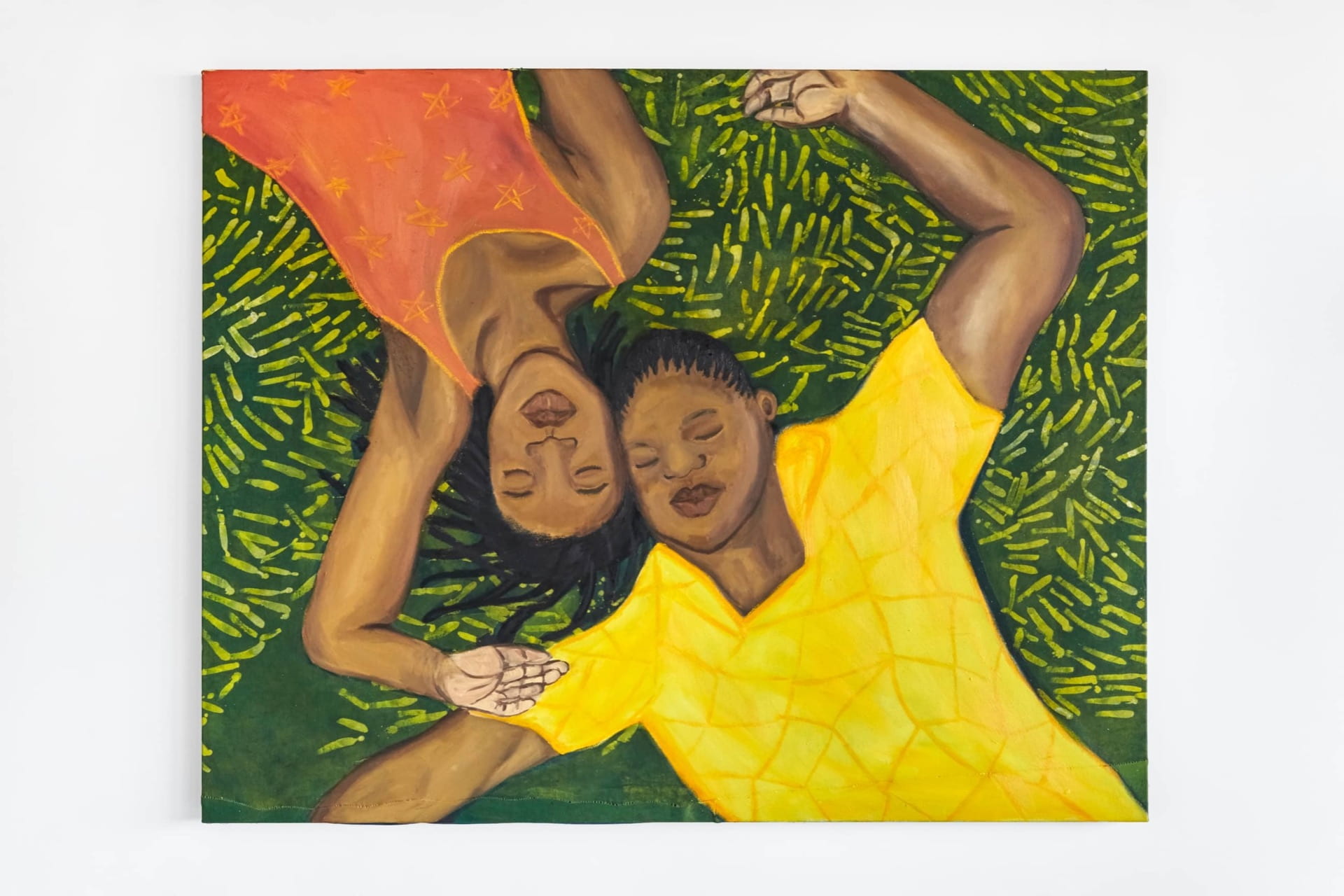Sola Olulode, Laying in the grass 1, 2020
Sola graduated from Fine Art Painting in 2018 at the University of Brighton. Her dreamy queer visions explore embodiments of British Black Womxn and Non-Binary Folx. Working with various mediums of natural dyeing, batik, wax, ink, pastel, oil bar, and impasto she develops textural canvases that explore the fluidities of identities. Drawing inspiration from lived experience, friends, and cultural reference points to centre Black Queer Womxn, Olulode emphasises the integral need of representation and celebration of queer intimacies. Her utopian scenes celebrate relationships that transcend crude notions of queer sexuality, her figures exemplify the warm embrace of queer love, a temporal space to bathe in memories of intimacies abundant with scenes of profoundly deep tender connections. Envisaging a world reflective of the celebration of her own identities Olulode brings to life representation and visibility of Black Queer lived experiences. Her figures represent multifaceted complex individuals and the energy they hold in their bodies relishing in a boundless temporality of self-validation and joy.
She will be featuring in a group exhibition at the Lisson Gallery, London titled ‘An Infinity of Traces’ with other UK-based established and emerging Black artists whose work explores notions of race, history, being and belonging. The exhibition opens on April 13th. The artists address these themes through a variety of mediums, from moving image to sculpture and installation. Curated by Ekow Eshun, writer, broadcaster and former Director of the Institute of Contemporary Arts London, the exhibition reflects not only on the Black Lives Matter protests, but the existence of a more sustained antipathy to the Black presence that, in Britain, has deep roots in the nation’s imperial past. With this legacy of hostility in mind, the artists confront topics such as self-care, kinship, and collective solidarity in their work.
The presentation offers a range of enquiries into the complexity of Black life and identity, recognising and highlighting Black identity as a multiple not singular condition, and one that is liable to continual redefinition and reimagining. The show takes its name from a quote by Antonio Gramsci who described how cultural identity is the consciousness of oneself as a multitude of historical processes, that creates, in turn, “an infinity of traces”.
The exhibition features film work by Ayo Akingbade, Ufuoma Essi, and Rhea Storr; visual and sound installations by Alberta Whittle and Evan Ifekoya; an experimental musical composition by Liz Gre; new photographic work by Liz Johnson Artur; new paintings by Sola Olulode, Jade Montserrat and Alexandria Smith; alongside painterly textiles by Emily Moore. The selection outlines some recent tendencies in contemporary practice, including most notably the centrality of Black feminism – in its various, expansive manifestations as politics, activism, theory and scholarship, ethics, the erotic, and creative discourse – as a key prism through which artists are making work and enquiring into society. Much of the work is newly commissioned for the show, or presented in London for the first time.
Gesturing back to the formative years of Black British contemporary art in the 1980s, An Infinity of Traces is presented as a conversation with the work of John Akomfrah, an artist who has consistently scrutinised issues of Black British identity and post-colonialism. Running concurrently with Akomfrah’s new exhibition, The Unintended Beauty of Disaster, at 67 Lisson Street, An Infinity of Tracesoffers an opportunity to gauge how artists today are interrogating themes of history, identity and belonging similar to those addressed by Akomfrah and his artistic peers four decades ago. Here, the Black body becomes the site of intersecting racial, sexual and cultural interpretations. And the question is asked, what does resistance to the anti-black present day look like? What might a de-colonial or anti-racist future look like? Can an exhibition be a site of liberation?
Ufuoma Essi, Bodies in Dissent, 2020 (film still)
For more information visit: www.lissongallery.com
Schedule your visit here



